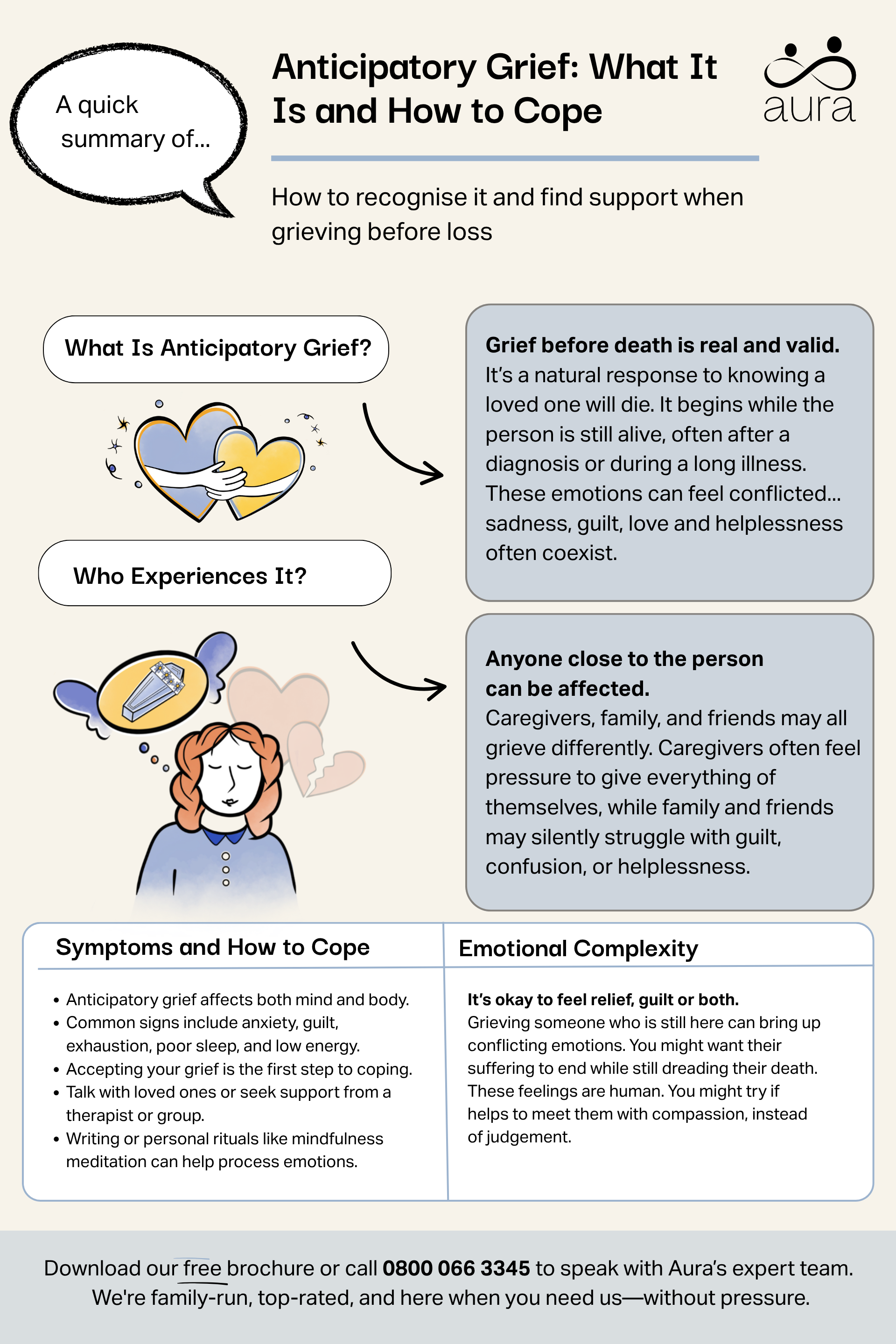


Written by Emily Cross.
20 minute read

When someone you love is nearing the end of their life, it is understandable if you find yourself starting to experience a deep sense of anticipatory grief, a type of grief that occurs before a death happens.
If you’re starting to have feelings of grief while your loved one is still alive may be confusing or overwhelming. Some feel resigned to what is ultimately going to happen, while others feel a profound sense of guilt, perhaps even shame for feeling this way. We are not here to judge, only to highlight ways forward you may wish to consider.
As a family-run funeral provider that works with people in similar situations on a daily basis, we have the honour of talking to some incredible individuals. Their resilience, ability to cope, and willingness to open up and be kind to themselves are truly moving. We hope that by using this experience to create this guide we may be able to offer you some words of comfort and support at this difficult time.
Our goal is never to prescribe a set path that you feel you have to follow — we are here to offer ideas and insights that you can then sit and reflect on at a time that feels right.
Key takeaways:

If you find that you are grieving before death, you may be experiencing anticipatory grief. For many of us, learning how to cope with the death of a parent or a loved one can actually begin before they die. An elderly parent who is terminally ill, for example, may present you with a set of emotional challenges that can force you to think of life without them. These feelings can be complicated and complex, but we hope that by taking a closer look at the nature and form they take you may be able to find a path that feels right to you.
Anticipatory grief is the emotional response to an expected loss before death, and it is a uniquely human response. It is most common among caregivers and close family who see the person regularly, and recognise that their health will ultimately not get better.
For many, these feelings begin at diagnosis or during a prolonged illness that then becomes terminal. Regardless of when they begin, learning to understand these feelings may help you manage your emotional energy at a time when you also want to give as much of yourself as you feel able to the person you love.
Experiencing grief before death may be confusing if you have only ever thought about how to go about remembering a loved one who has died. The fact that your loved one is still there and you can still interact with them in some capacity may make you feel like you are torn between grieving for them and continuing to support them.
You may find that anticipatory grief extends considerably longer than post-death grief, especially if the person you love is facing a serious illness with a variety of complications during the final stages of their life. You may also find that your sense of anticipatory grief is silent, unspoken, and gradually builds in the background.
The reason we wish to highlight these different versions of grief is to express the fact that all of them are equally valid. You have the right to grieve however you see fit and however feels right to you — no one has the right to judge you for doing so. If you find that you begin to mourn a loved one or partner who is still alive, accepting that these feelings are understandable and are not a reflection that you no longer care about the person you love will allow you to exercise self-compassion.

There are a number of anticipatory grief symptoms that you may find helpful to familiarise yourself with. Taking a moment to consider which ones you connect with and resonate with may help you begin to clarify how you feel.
Taking a moment to sit with your feelings and see if you identify with any of these common symptoms may help you clarify your thinking:
Sometimes these feelings may only make fleeting appearances during the day, but other times they may feel like they are all-consuming. Both experiences are equally valid and understandable given the situation you are currently trying to navigate.
The emotional toll that you may find yourself having to manage at this time can impact other areas of your life in a variety of ways. Reduced sleep quality, a loss of appetite, an inability to focus, and chronically low energy are all common.
Anticipatory grief can affect your overall well-being, perhaps even your sense of self, because of the emotional strain it can place on you. One of the key things about grieving is practicing the act of recognising how you think and feel. It is perfectly understandable to find your current situation all-consuming and to feel like nothing else matters, but taking a step back when you feel able to is really important.
By validating your own feelings and giving yourself permission to recognise your own needs you can give yourself a chance to recharge your emotional energy. The result could be having more to give to the person you love.
Pre-grief can be experienced by anyone who is faced with the prospect of someone they love dying. Regardless of how close others may feel you are to them, you have the right to feel this way and deserve compassion.
A caregiver experiences a unique emotional pressure because they are the person who spends the greatest amount of time with the person who is dying. They may feel helplessness, guilt, and a deep sense of love all at the same time, which may prove to be confusing and emotionally draining.
As the primary carer, you may feel like it is your responsibility to give every bit of yourself to the person you love. While this is certainly admirable, you may find it helpful to think about how sustainable it is. Making time for self-care and support by arranging a small period of regular respite care may help you maintain your energy levels and ultimately give so much more to the person you love.
Watching a loved one suffer or change may result in you struggling to maintain a sense of normalcy while emotionally preparing yourself for what will inevitably follow. Family members and close friends will experience these emotions in different ways as a result of different personalities, living arrangements, and closeness to the person who is dying. Each experience is equally valid and something that may be helpful to consider if you find that a member of the family seems to be grieving in a way that is at odds with the rest of you.
Knowing how to cope with grief before death may often start with knowing how to break bad news to the rest of the family. Telling them that someone they love will not get better or may never return home can often trigger the initial feelings or pre-grief outlined above.
Naming and validating your emotional experience may help you to see it in a way that allows you to start understanding yourself. Accepting that it’s okay to feel grief before a death occurs could help you to begin processing how you feel and making arrangements for what comes next. Some also find that working to achieve a heightened state of self-awareness may lead to more meaningful connection and closure.
Having open conversations with the loved one, when possible, may help you to talk things through in a way that recognises the fact they are still here. While you may not want to put extra pressure onto them during their final days, you may find that opening up and expressing your love, sharing memories, and perhaps even saying goodbye can help you process how you feel. It may also help to be aware of the fact that many people report feeling even closer to their loved one during their final days and that it is perfectly understandable and very common for emotions to heighten during this time.
You find that speaking to a therapist or grief counsellor can help you to process how you are feeling. Others may find that joining a local support group can help maintain perspective and show them that they are not alone and that there are alternatives to emotionally isolating themselves from the world.
Others may find that a more symbolic, less personal approach can provide a lasting sense of support and guidance. Taking a look at the different symbols of grief to see if one connects with you may help you come to terms with how you are feeling in your own way.
Even something small like reading the first few lines of our end-of-life planning guide may produce a complex set of emotions that leave you feeling unable to continue. Accepting and recognising these feelings may help you find an alternative approach to moving forward.
It is understandable if you find that conflicting emotions arise during this time because your brain is attempting to come to terms with something that is highly complex. You should not feel guilty when you find yourself hoping for peace if your loved one is suffering, nor should you feel upset with yourself for dreading the final moment because losing your loved one may be overwhelming.
Many people find themselves torn between wanting their loved one to finally be in peace so they are no longer suffering and staying alive for as long as possible. Both feelings are equally valid and it is common for them to coexist even if you may not feel it makes sense at the time.
The simple act of reflection carried out by daily journaling gives you time and space to begin processing your array of emotions. Some even find that doing so can foster emotional growth and deeper understanding, enabling them to know what to do when someone dies from a self-care point of view. You may even find that you are able to begin your healing journey before your loved one dies and that by doing so you are able to maintain a greater sense of emotional balance during the final stages of mourning.
Considering how those with professional training and decades of experience would approach things may give you a sense of direction and something that you can anchor yourself to.
You may find that therapy can help you navigate anticipatory emotions in a way that gives you coping mechanisms that you can lean on later on. One thing to consider is the sustainability of your approach and how you may benefit from regular ongoing support rather than attempting to solve everything at once. You may find that being able to emotionally regulate and set healthy boundaries becomes easier when you have a regular sounding board you can use to clarify your thinking and adapt your approach to changing situations.
Many forms of end-of-life care include emotional and spiritual support that is designed to help the surviving family as well as the person who is dying. If you find that a habit, ritual, or faith-based practice provides a sense of continuity or a feeling of permanence that you can anchor yourself to, you may want to explore how it can become a regular part of your daily routine. The only thing that matters is finding something that works for you, not finding something that you can persuade others you know to try.
It’s understandable if you have read this far and find that you are still asking yourself questions about the situation you find yourself in. We hope that this section will go some way to shedding some light on everything.
Grieving before death is a recognised emotional process and one that stems from the fact that you love someone. Feelings of confusion, guilt, and even shame are all understandable at this point in your life, but that doesn’t mean you are doing anything wrong or experiencing anything unusual. What you are experiencing is a perfectly understandable reaction to a highly emotional, upsetting, and often unexpected situation.
There is no set duration for anticipatory grief because everyone has different emotional responses and emotional needs. The length of the illness or nature of the injury, the relationship you have with your loved one, and the degree of involvement you have in their day-to-day care will all contribute to the way you feel.
A common factor many people experience is a lengthy period of emotional fatigue as a result of the intense emotions they are processing. Many also report that the nature of their grief ebbs and flows with time as they begin to process and eventually accept what happens. You may have heard about the five stages of grief; and even within those five stages, there is no definitive path forward, only what feels right to you.
Anticipatory grief will also be different depending on how your loved one’s life is ending, how old they are, and their role in your life. Here are a couple of common examples that may help you gain some perspective or give you a chance to clarify your thinking on the matter.
There is often a deep emotional impact that comes from watching a parent decline and go from someone who raised you to someone you now feel responsible for caring for. This sense of role reversal may bring feelings of guilt and helplessness that could feel like they are getting in the way of your final days with your mother or father. Being kind to yourself and recognising the fact that you are doing everything you can to be present in their life may allow you to keep moving forward.
Witnessing a cognitive or physical decline leads some people to experience a feeling of “losing someone twice” in cases where their loved one no longer recognises them on a consistent basis. Dementia, in particular, can lead you to reflect for a considerable time on how to announce a death to friends and family when part of you feels that your loved one has already left you in some senses. This is perfectly understandable and a very human reaction to a change in your relationship that no one could have foreseen.
Before we finish, we thought it may help to share an idea about how others have approached anticipatory grief. If you feel able to process it and adapt it to your own way of thinking, you may find that it gives you something to work through at this time.
Writing letters, journal entries, and poems are emotional outlets that could give you the time and space you need to clarify your thinking. Having to find the choice of words and turn of phrase that get your thoughts and feelings down on paper may help you put some distance between how you feel right now and how you could feel tomorrow and the day after. Reframing writing as a way to process and consider your thoughts and emotions from a distance is something you may find helps you to grieve.
We sincerely hope that you have found some words of comfort or perhaps a way forward in our words. Everyone will navigate this complex issue in their own way, so please do not worry or cause yourself additional stress if you don’t see your own experience reflected in full in our guide.
We also want to let you know that we are here to help with some of the many practical considerations you may find yourself responsible for at this time. We specialise in compassionate options such as our *prepaid funeral plans for those who are still alive, as well as flexible direct cremation services that are designed to allow you to mourn in your own way. There is also a guide that can help you compare funeral plans should you find it useful.
*Terms and conditions apply. You will receive a funeral plan summary before purchase.



Anticipatory grief is when you come to realise that someone you love will die, whether through injury or illness, and you start to mourn them even when they are still alive. For example, if your parent or partner is terminally ill, you may find that you are forced to visualise life without them before the moment they die and are no longer with you. This can make the process of grieving particularly complex because as you start to navigate it, you may still be caring for your loved one.
Grief before death is complex and can be emotionally draining, but that doesn’t mean there aren’t ways for you to move forward. While everyone navigates this complex process in their own way, you may find it helpful to sit with the grief and accept it as a natural consequence of your situation. Yes, you are grieving for someone who is still alive, but at the same time, many others in your position would feel the same way. How you feel is understandable and doesn’t mean that you love that person any less or that you are ‘checking out’ on them while they are still here.
Yes, although difficult and complex, anticipatory grief is normal. Knowing that someone you care for will die and won’t get better may place a significant emotional strain on you at a time when you also need to be providing them with care during their final days. Having some awareness of the fact that their life is nearing its end is completely normal and something many people in your situation are going through right now.
Dealing with the emotional pain that can arise when a loved one is diagnosed with a terminal illness may be one of the hardest things you have to do, but you are not alone. You are being faced with the mortality of someone you love and being forced to accept the fact that nothing you do will be able to make them better. That said, you may find it helps to find ways that you can add little moments of joy and happiness to their day. Little gestures and new traditions may give the two of you something to anchor yourselves to at what is an understandably difficult time.
Yes, you have every right to grieve however feels natural to you. It’s not a sign that you are turning your back on your relative or loved one, and it’s not a sign that you feel their suffering is inevitable. Grieving before a death in the family is a way to come to terms with the fact that the person you love may not get better and that your life will have to continue without them by your side.
When a loved one has a terminal illness it may be hard to find the words to console and comfort them, but perhaps there is another approach here. Some find that trying to add little moments of happiness and relief, rather than to make the person feel better about everything all the time, is something that is more manageable. Showing them that you are there for them and want to help them make a few more memories while they still have the time is something that could make a real difference to how they feel.
Preparation of this sort is a personal experience and not something that you should feel compelled to do in any particular way. The key point here is that there will be days where you find a sense of acceptance followed by others where the unfairness and tragedy of the situation may feel overwhelming. Being kind to yourself and reminding yourself that you are doing everything possible to add some brighter moments along the way may help you make your emotional preparations and start processing your feelings. You are doing the best you can.
Feelings of dread, foreboding, and even a sense of disconnection at times from your loved one are all understandable. You are only human and experiencing these emotions is something that many people in a similar position are going through right now. Learning to spot them, sit with them, and then be kind to yourself for experiencing them may help you to keep moving forward in a way that doesn’t take too much emotional energy from you.
staging site last replicated: MISSINGNO.